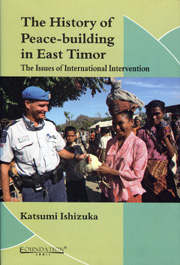Book contents
- Frontmatter
- Contents
- Preface
- Acknowledgements
- Acronyms
- Introduction
- Section 1 Historical Background
- Chapter I East Timor in the Cold War Period
- Chapter II Pro-Indonesia Militia Campaigns and International Response in 1999
- Section 2 Policy Analysis
- Section 3 Comparative Analysis
- Conclusion
- Bibliography
- Index
Chapter II - Pro-Indonesia Militia Campaigns and International Response in 1999
from Section 1 - Historical Background
Published online by Cambridge University Press: 26 October 2011
- Frontmatter
- Contents
- Preface
- Acknowledgements
- Acronyms
- Introduction
- Section 1 Historical Background
- Chapter I East Timor in the Cold War Period
- Chapter II Pro-Indonesia Militia Campaigns and International Response in 1999
- Section 2 Policy Analysis
- Section 3 Comparative Analysis
- Conclusion
- Bibliography
- Index
Summary
Militia Intimidation during the Ballot Period
In accordance with the 5 May Agreement, 1999, the Indonesian and the Portuguese governments entrusted the UN Secretary-General with organising and conducting a ‘popular consultation’ in order to ascertain whether the East Timorese people accepted or rejected special autonomy for East Timor within Indonesia. To carry out the consultation, on 11 June 1999, the Security Council established the United Nations Mission in East Timor (UNAMET), whose main mission was to set up and monitor the referendum. However, as Geoffrey Robinson puts it, UNAMET started ‘with the almost impossible aim of holding the popular consultation in August, less than three months away.’
This difficulty stemmed mainly from pro-integration militia activities. Most of the militiamen were the uneducated and unemployed flotsam of society. Many of them were coerced into joining or were bribed with food, money or alcohol and had no strong ideological commitment to their cause. Among them, the two pro-integration militias, ‘Red and White Iron’ and ‘Thorn’ were radical. In fact, in April 1999, the two militia groups gathered in front of the Governor's residence to hold a rally to publicise their belief that the majority of East Timorese wanted the territory to remain a part of Indonesia. At that time, leader of the Thorn militia told the crowd: “I command all pro-integrationist militia to conduct a cleansing of all those who betrayed integration.
- Type
- Chapter
- Information
- The History of Peace-Building in East TimorThe Issues of International Intervention, pp. 39 - 60Publisher: Foundation BooksPrint publication year: 2010

